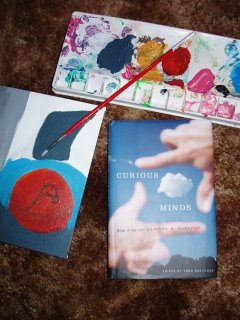Curious Minds
 This little feller was in class VI when the story starts - tempestuous, enthusiastic, curious, a devil for his mom to deal with.
This little feller was in class VI when the story starts - tempestuous, enthusiastic, curious, a devil for his mom to deal with.That sweaty afternoon, he was perched on the storage shelf (paranai) of his room, suspended near the roof, with a less-than-minimum-length shorts and an undershirt (banian) covered with sand from the recent game of push-me-off-the-mound, hair riddled with cobwebs and eyes eagerly searching for ancestorial treasures from the past, banished to the dark confines of the paranai by the wise-women in his household. The war with the annoyingly hyperactive silverfish was finally won as he dug out a tattered biographic compilation of Edison, Bell, Morse and a long list of other brilliant inventors. The pages were brown and about to break apart but the book itself begged to be devoured on sight. Compliance was prompt. The next year, he built a fountain for his garden, a model crane to remove iron filings from sand (Mittal, beware!) and a model winch to carry his workers to the mines...
I still remember this book 15 years later. It was uttely fascinating then, as it is now, and inspired me on a geeky path of wanting to peer into the unknown. "Curious minds", a similar book, is a collection of short autobiographical essays by various scientists (including David Buss, Robert Sapolsky, Murray Gell-Mann, Freeman Dyson and V. S. Ramachandran) - physists, sociologists, primatologists and neuroscientists among others. Each of them writes about childhood influences that prodded them on the path they have followed since. Most of them are colorful, some raunchy, some very honest and modest but all of them wonderfully inspiring. Ultimately, it is clear that providing the right and stimulating atmosphere for children (without demanding excessive performance or placing unreasonable burdens upon them) is essential to nurture their curiosity. A good environment fosters creativity and ultimately, the kids end up being happy. This is all simple and almost trivial but it is surprising, how few people figure it out and put it into practice. Prime examples being countries like Korea, India, and China, where little kids spent most of their time awake, thrust upon anvils and hammered with science, mathematics and arts into their asphyxiated and unresponsive brains. Perhaps, we are merely creating large, living, moving RAM assemblies instead of developing humans. And most certainly, it is not making anyone happier... Read this book and you will change your mind about pushing your kids into such brutal and destructive paths.
In summary, Curious minds is a perfectly good book that will brighten your days. But works only if you happen to be curious.
2 Comments:
Good suggestion, will try it out. Curiosity may yet make one a cat, not kill it.
"a fountain for his garden, a model crane to remove iron filings from sand (Mittal, beware!) and a model winch to carry his workers to the mines..."
Now am curious :)
Post a Comment
<< Home